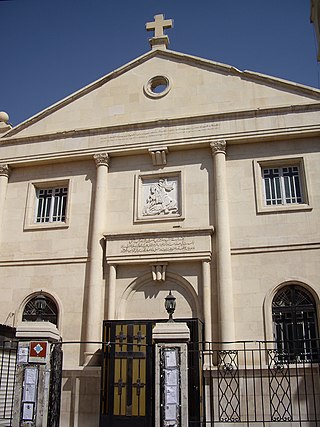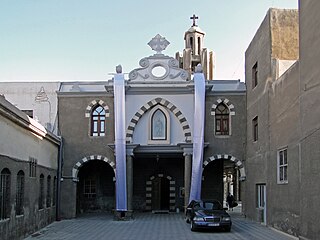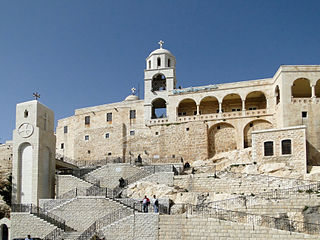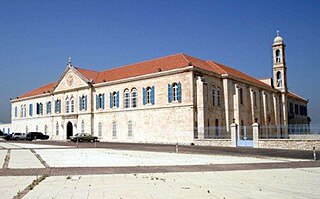The Patriarchate of Antioch is the office and jurisdiction of the bishop or Patriarch of Antioch , the Christian Church's oldest episcopal see, tracing its origin to Saint Peter and originally located in Antioch, now Antakya in Turkey. It has been formally designated as Patriarchate since 531. Several traditions have claimed succession of the early Church of Antioch , none of which however has been based in Antioch/Antakya for centuries:

Patriarchate is an ecclesiological term in Christianity, designating the office and jurisdiction of an ecclesiastical patriarch. According to Christian tradition three patriarchates were established by the apostles as apostolic sees in the 1st century: Rome, Antioch, and Alexandria. Constantinople was added in the 4th century and Jerusalem in the 5th century. Eventually, together, these five were recognised as the pentarchy by the Council of Ephesus in 431.

The Syriac Orthodox Church, officially known as the Syriac Orthodox Patriarchate of Antioch and All the East, and informally as the Jacobite Church, is an Oriental Orthodox church that branched from the Church of Antioch. The bishop of Antioch, known as the patriarch, heads the church and possesses apostolic succession through Saint Peter, according to sacred tradition. The church upholds Miaphysite doctrine in Christology, and employs the Divine Liturgy of Saint James, associated with James, the brother of Jesus. Classical Syriac is the official and liturgical language of the church.

The Syriac Catholic Church is an Eastern Catholic Christian jurisdiction originating in the Levant that uses the West Syriac Rite liturgy and has many practices and rites in common with the Syriac Orthodox Church. Being one of the twenty-three Eastern Catholic Churches, the Syriac Catholic Church is a self-governed sui iuris particular church, while it is in full communion with the Holy See and with the entirety of the Catholic Church.

An exarch was the holder of any of various historical offices, some of them being political or military and others being ecclesiastical.
Patriarch of Antioch is a traditional title held by the bishop of Antioch. As the traditional "overseer" of the first gentile Christian community, the position has been of prime importance in Pauline Christianity from its earliest period. This diocese is one of the few for which the names of its bishops from the apostolic beginnings have been preserved. Today five churches use the title of patriarch of Antioch: one Oriental Orthodox ; three Eastern Catholic ; and one Eastern Orthodox.

The Greek Orthodox Patriarchate of Antioch, also known as the Antiochian Orthodox Church and legally as the Greek Orthodox Patriarchate of Antioch and All the East, is an autocephalous Greek Orthodox church within the wider communion of Eastern Orthodox Christianity and one of the historic Pentarchy. Headed by the Greek Orthodox patriarch of Antioch, it considers itself the successor to the Christian community founded in Antioch by the Apostles Peter and Paul.
The Church of Antioch was the first of the five major churches of the early pentarchy in Christianity, with its primary seat in the ancient Greek city of Antioch.

The Melkite Greek Catholic Church, or Melkite Byzantine Catholic Church, is an Eastern Catholic church in full communion with the Holy See as part of the worldwide Catholic Church. Its chief pastor is Patriarch Youssef Absi, headquartered at the Cathedral of Our Lady of the Dormition, Damascus, Syria. The Melkites, who are Byzantine Rite Catholics, trace their history to the early Christians of Antioch, formerly part of Syria and now in Turkey, of the 1st century AD, where Christianity was introduced by Saint Peter.
Patriarchate of Jerusalem may refer to:

The Melkite Catholic Patriarchate of Antioch is the only actual residential Patriarchate of the Melkite Greek Catholic Church. It was formed in 1724 when a portion of the Orthodox Church of Antioch went into communion with Rome, becoming an Eastern Catholic Church, while the rest of the ancient Patriarchate continues in full communion with the rest of the Eastern Orthodox Church.

The West Syriac Rite, also called the Syro-Antiochian Rite and the West Syrian Rite, is an Eastern Christian liturgical rite that employs the Divine Liturgy of Saint James in the West Syriac dialect. It is practised in the Maronite Church, the Syriac Orthodox Church, the Syriac Catholic Church and various Malankara Churches of India. It is one of two main liturgical rites of Syriac Christianity, the other being the East Syriac Rite.

Christianity in Lebanon has a long and continuous history. Biblical Scriptures purport that Peter and Paul evangelized the Phoenicians, whom they affiliated to the ancient patriarchate of Antioch. The spread of Christianity in Lebanon was very slow where paganism persisted especially in the mountaintop strongholds of Mount Lebanon. A 2015 study estimates some 2,500 Lebanese Christians have Muslim ancestry, whereas the majority of Lebanese Christians are direct descendants of the original early Christians.

Christians in Syria make up about 10% of the population. The country's largest Christian denomination is the Greek Orthodox Church of Antioch, closely followed by the Melkite Greek Catholic Church, an Eastern Catholic Churches that shares its roots with the Eastern Orthodox Church of Antioch, and then by Oriental Orthodox Churches such as Syriac Orthodox Church and Armenian Apostolic Church. There are also a minority of Protestants and members of the Assyrian Church of the East and Chaldean Catholic Church. The city of Aleppo is believed to have the largest number of Christians in Syria. In the late Ottoman rule, a large percentage of Syrian Christians emigrated from Syria, especially after the bloody chain of events that targeted Christians in particular in 1840, the 1860 massacre, and the Assyrian genocide. According to historian Philip Hitti, approximately 900,000 Syrians arrived in the United States between 1899 and 1919. The Syrians referred include historical Syria or the Levant encompassing Syria, Lebanon, Jordan and Palestine. Syrian Christians tend to be relatively wealthy and highly educated.
Semaan is a Christian surname mainly found in the Levant area of the Middle East. It is derived from the Semitic root word/verb sema or shema, which means “to hear”; thus, the meaning of Semaan becomes “the one who hears or listens” in both Syriac Aramaic and Arabic. Its equivalent in Hebrew is שִׁמְעוֹן, which also has the same meaning. The Greek transliteration is Σιμων (Simon) or Συμεών (Symeon), and, when Latinized, it becomes Simon or Simeon.

The Maronite Catholic Patriarchate of Antioch is the seat of the Patriarch of the Maronite Church. It is currently governed by the Patriarch Cardinal Bechara Boutros al-Rahi, OMM.
Patriarchate of Constantinople generally refers to the Ecumenical Patriarchate of Constantinople, the seniormost authority in the Eastern Orthodox Church, led by the Ecumenical Patriarch of Constantinople. The diocese of Constantinople is alleged to have originated with Andrew the Apostle's visit in 38, and has been formally designated as Patriarchate since 531. Its seat is the city successively known as Byzantium, Constantinople, and now Istanbul, Turkey.
Catholic Patriarch or Patriarchate of Antioch may refer to:
The Church of Antioch was one of the five major churches that composed the Christian Church before the East–West Schism.

The Maronite Church is an Eastern Catholic sui iuris particular church in full communion with the pope and the worldwide Catholic Church, with self-governance under the Code of Canons of the Eastern Churches. The current head of the Maronite Church is Patriarch Bechara Boutros al-Rahi, who was elected in March 2011 following the resignation of Patriarch Nasrallah Boutros Sfeir. The current seat of the Maronite Patriarchate is in Bkerke, northeast of Beirut, Lebanon. Officially known as the Antiochene Syriac Maronite Church, it is part of Syriac Christianity by liturgy and heritage.

The Holy Qurobo or Holy Qurbono refers to the Eucharist as celebrated in Syro-Antiochene Rite and the liturgical books containing rubrics for its celebration. West Syriac Rite includes various descendants of the Oriental Orthodox and Eastern Catholic churches. It consists of two distinct liturgical traditions: the Maronite Rite, and the Jacobite Rite. The major Anaphora of both the traditions is the Divine Liturgy of Saint James in Syriac language. The Churches are primarily based in the Middle East, Africa, and India.